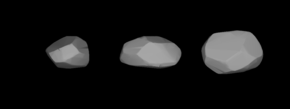816 Juliana is a minor planet orbiting the Sun. It measures 59.85k in diameter. It was discovered on 8 February 1916 by Max Wolf at the Landessternwarte Heidelberg-Königstuhl Observatory in Heidelberg, Germany.
 A three-dimensional model of 816 Juliana based on its light curve | |
| Discovery | |
|---|---|
| Discovered by | Max Wolf |
| Discovery site | Heidelberg Observatory |
| Discovery date | 8 February 1916 |
| Designations | |
| (816) Juliana | |
| 1916 YV | |
| Orbital characteristics[1] | |
| Epoch 31 July 2016 (JD 2457600.5) | |
| Uncertainty parameter 0 | |
| Observation arc | 100.18 yr (36592 d) |
| Aphelion | 3.3307 AU (498.27 Gm) |
| Perihelion | 2.6721 AU (399.74 Gm) |
| 3.0014 AU (449.00 Gm) | |
| Eccentricity | 0.10971 |
| 5.20 yr (1899.2 d) | |
| 104.02° | |
| 0° 11m 22.38s / day | |
| Inclination | 14.330° |
| 127.863° | |
| 21.017° | |
| Physical characteristics | |
| 29.925±0.6 km | |
| 10.58 h (0.441 d) | |
| 0.0311±0.001 | |
| 10.4 | |
Wolf probably chose the name to honour Princess Juliana (later Queen Juliana of the Netherlands); he had previously named 392 Wilhelmina after her mother.[2]
References
edit- ^ "816 Juliana (1916 YV)". JPL Small-Body Database. NASA/Jet Propulsion Laboratory. Archived from the original on 19 July 2020. Retrieved 4 May 2016.
- ^ Lutz D. Schmadel (2011). Dictionary of Minor Planet Names. Addendum to Fifth Edition: 2006–2008. Springer. ISBN 978-3-642-01966-1.
External links
edit- 816 Juliana at AstDyS-2, Asteroids—Dynamic Site
- 816 Juliana at the JPL Small-Body Database